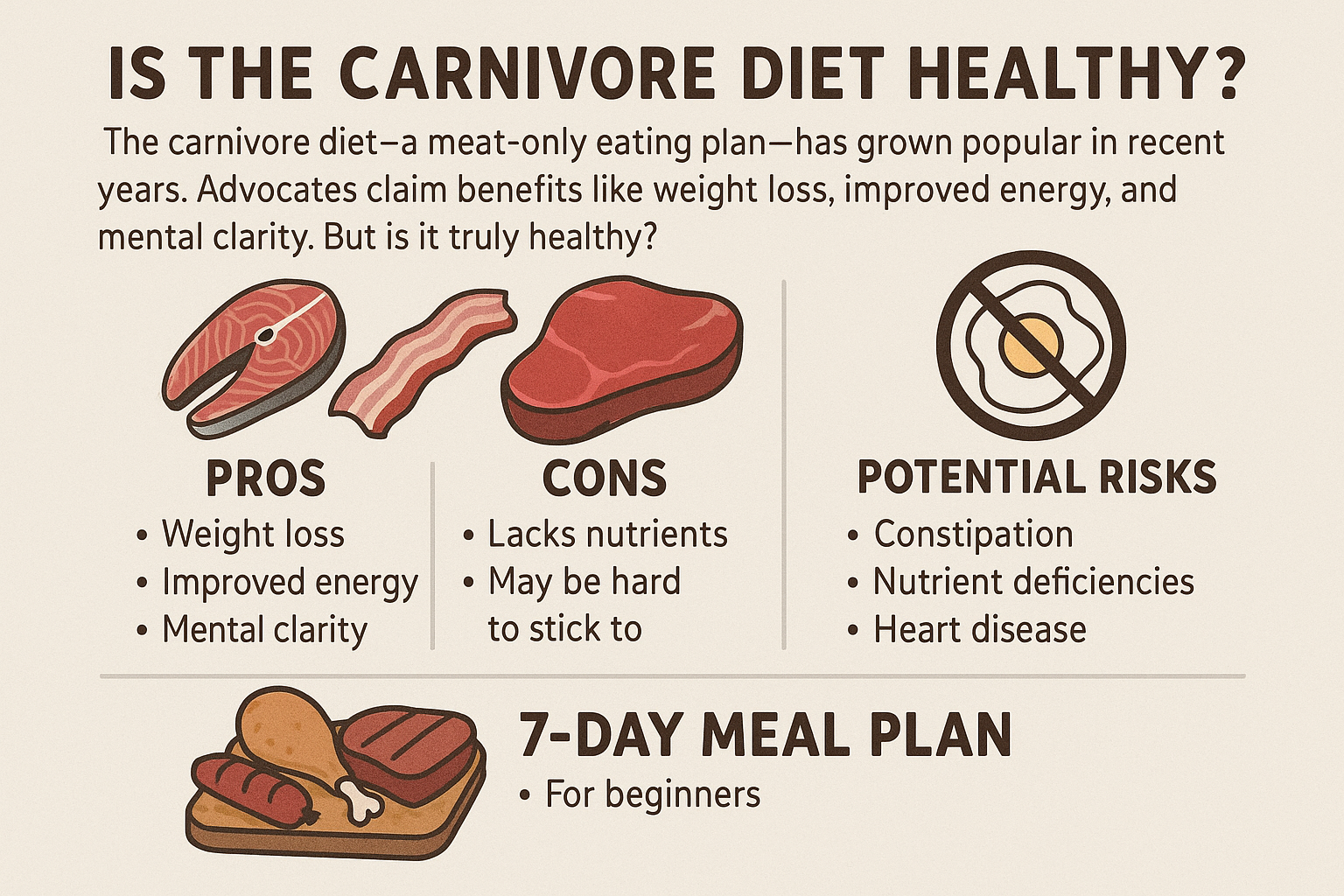The carnivore diet—a meat-only eating plan—has grown popular in recent years. Advocates claim benefits like weight loss, improved energy, and mental clarity. But is it truly healthy? In this article, we explore the pros and cons, potential risks, and provide a sample 7-day meal plan for beginners.
What Is the Carnivore Diet?
The carnivore diet is a strict eating plan emphasizing animal-based foods only, such as meat, fish, eggs, and some dairy. It eliminates all plant-based foods, including fruits, vegetables, grains, and legumes. Unlike the keto diet, the carnivore diet is entirely animal-based, focusing on protein and fat.
Origins of the diet trace back to ancestral eating habits, with followers claiming humans thrive on meat. While controversial, it appeals to those seeking a simple, high-protein diet.
Potential Health Benefits of the Carnivore Diet
Weight Loss and Appetite Control
High-protein diets can increase satiety, helping reduce calorie intake naturally. This makes weight loss achievable without strict counting.
Blood Sugar Regulation
Some evidence suggests a meat-only diet may stabilize blood sugar and improve insulin sensitivity, beneficial for individuals with type 2 diabetes or insulin resistance. Read study.
Reduced Inflammation and Digestive Relief
Anecdotal reports show reduced bloating and joint pain. Eliminating certain plant compounds may help some people experience less inflammation.
Simplicity and Convenience
With fewer food choices, meal planning becomes straightforward. Many find it easier to stick to than complex diets.
Risks and Side Effects of the Carnivore Diet
Nutrient Deficiencies
Excluding plants may lead to deficiencies in vitamins C, fiber, magnesium, and potassium, which are critical for health.
Digestive Issues
Low fiber intake can cause constipation or other digestive problems. The gut microbiome may also be affected by long-term adherence.
Long-Term Health Concerns
High intake of red or processed meats can increase heart disease risk, and very high protein intake may strain the kidneys. Learn more from the American Heart Association.
Sustainability and Social Factors
The diet can be socially restrictive and environmentally challenging, making long-term adherence difficult.
Carnivore Diet Pros and Cons Table
| Pros | Cons |
|---|---|
| Rapid weight loss | Nutrient deficiencies |
| Simple to follow | Digestive issues |
| Appetite suppression | Potential heart/kidney risks |
| Blood sugar control | Socially restrictive |
Sample 7-Day Carnivore Diet Meal Plan
Tips: Stay hydrated, add salt as needed, and consider supplements for vitamins and minerals missing from a meat-only diet.
- Day 1: Breakfast: Scrambled eggs with bacon, Lunch: Grilled chicken thighs, Dinner: Ribeye steak
- Day 2: Breakfast: Omelette with cheese, Lunch: Salmon fillet, Dinner: Ground beef patties
- Day 3: Breakfast: Boiled eggs and sausages, Lunch: Pork chops, Dinner: Lamb leg roast
- Day 4: Breakfast: Cheese omelette, Lunch: Tuna salad (tuna + mayo), Dinner: Beef ribs
- Day 5: Breakfast: Scrambled eggs with ham, Lunch: Grilled mackerel, Dinner: Sirloin steak
- Day 6: Breakfast: Fried eggs and bacon, Lunch: Chicken drumsticks, Dinner: Pork belly
- Day 7: Breakfast: Omelette with leftover meats, Lunch: Shrimp or fish fillet, Dinner: Ribeye or lamb chops
Who Should Avoid the Carnivore Diet?
Avoid the diet if you have:
- Kidney disease or heart conditions
- Nutrient deficiencies
- Pregnancy or breastfeeding needs
- Difficulty following restrictive diets
Always consult a healthcare professional before starting. Learn more from the National Kidney Foundation.
Final Thoughts: Is the Carnivore Diet Right for You?
The carnivore diet may support weight loss, appetite control, and blood sugar management, but comes with potential nutrient deficiencies and health risks. While simple and convenient, it may not be sustainable or ideal for everyone.
Recommendation: Start slowly, monitor your health, and consult a professional. For most people, a balanced diet including plant foods remains the safest approach for long-term health.

